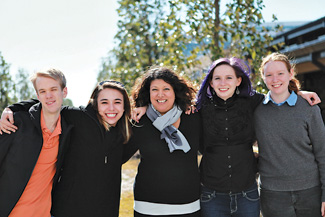Two UT Dallas Moot Court teams finished among the top 32 teams at this year’s American Collegiate Moot Court Association National Tournament, hosted Jan. 13 and 14 at Chapman University in Orange, California.
The teams—one comprised of Richard Stees and Michelle Nirumandrad, the other of Faith Boyle and Irene Morse—performed well enough at the ACMA Southwestern Regional Tournament to receive invitations to the National Tournament. Stees and Nirumandrad placed first overall in the regional competition and were seeded seventh nationally.

Two UT Dallas Moot Court teams finished among the top 32 teams at this year’s American Collegiate Moot Court Association National Tournament. Pictured left to right are Richard Stees, Michelle Nirumandrad, adviser Anne Dutia, Faith Boyle and Irene Morse. (Photo by Yang Xi, UTD Mercury)
Both teams made it to the second day’s “double-octofinal” round. UT Dallas Moot Court coach and pre-law program adviser Anne Dutia said she is pleased with this year’s success.
“They were in the top 32 in the nation, which puts them roughly in the top 10 percent of Moot Court teams in the country,” Dutia said.
To achieve this level of success requires constant practice. Stees said that UT Dallas’ team members started reviewing the “case problem”—the legal issue that is debated at all levels of competition in a given year—during the summer of 2011. The teams then took a three-hour Moot Court class in the fall.
UT Dallas’ faculty also factored into this year’s success. Dutia said the constitutional law course offered in the fall, is both a prerequisite to be on Moot Court and a key part of preparing students for the competition. Stees ascribed a large part of his success to practice sessions judged by UT Dallas professors like Anthony Champagne and Douglas Dow.
Stees said that once a Moot Court team knows its arguments and the case problem well enough, practice becomes all about preparing for the day of the competition, being comfortable and conversational with the judges and being able to think quickly if things don’t go according to plan.
The Mercury Online
This report, by staff writer Kyle Reynolds, originally appeared in The UTD Mercury newspaper. The publication, produced entirely by UT Dallas students, can be read online.
“What would really separate a good Moot Court team from another is just being able to adapt to this type of (unexpected) questioning, to be able to be flexible with your arguments and to be able to respond to the judges’ questionings just as they would like you to,” Stees said.
Both Dutia and Stees said that Moot Court serves as excellent preparation for the sort of things students do in law school.
“Essentially, it’s this opportunity for critical analysis,” Stees said. “You are working with precedent that is often decades old and being able to apply it to a very recent problem. Taking that case law and reconciling it with the present circumstances is the type of critical analysis that a lot of enterprising young pre-law students could use.”
UT Dallas fields four Moot Court teams each year. Other team members were Chris McAlister and Braeden Mayer and Stevin George and Monica Niewiarowski. Students interested in participating in Moot Court should contact Anne Dutia, the Moot Court coach.